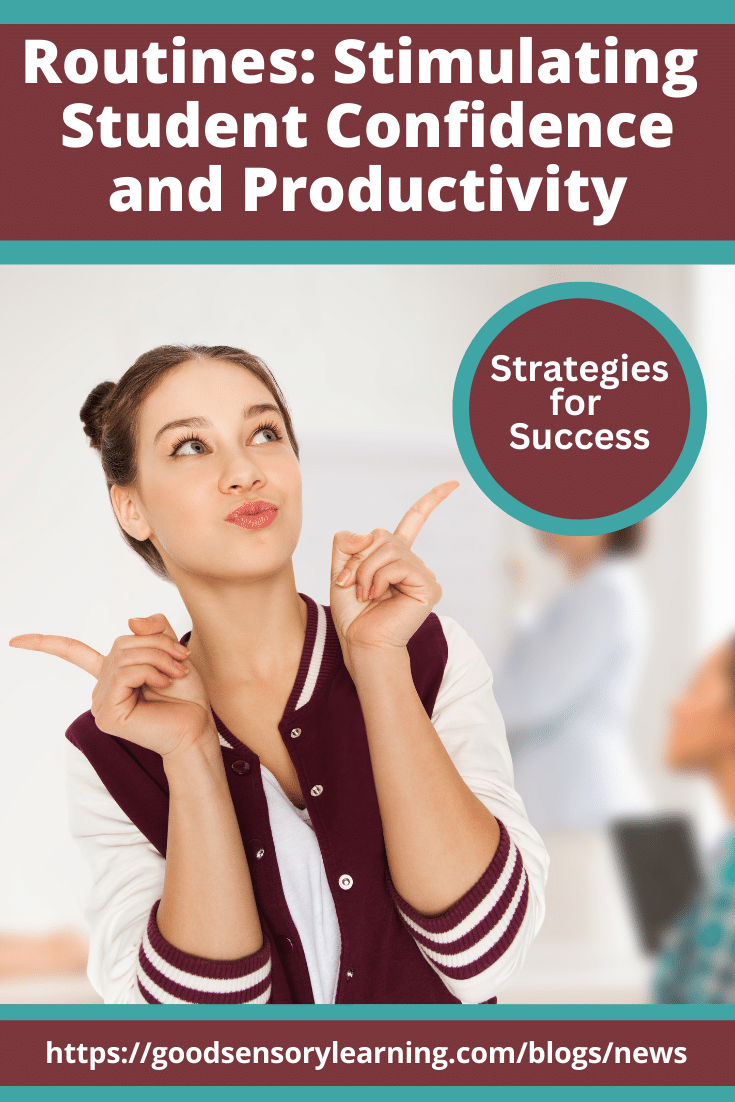Routines - Stimulating Student Confidence and Productivity
Helping students establish positive, daily routines can be a lesson that will serve them throughout their lives. Instead of aimlessly floating from task to task, when students learn to create a structured schedule with intentions and goals, they can steer their way to high marks, navigate childhood stressors, and cultivate improved confidence and productivity.

Creating Routines Throughout the Day:
Establishing routines throughout the day can help both parents and teachers maintain power and respect while providing kids with the structure that they need. For this blog post, I will be focusing on a home routine, but many of these ideas and principles can be applied to the classroom. You’ll notice that I include positive intentions, affirmations, and gratitude, as this can help nurture a positive attitude as well as a positive inner voice.

Getting your children into the following habits can make mornings more manageable for all family members. You can pick and choose from the following options or create your own. The important thing to do is to start with a written checklist until the tasks become habitual:
Morning Routine:
- Get out of bed the first time your alarm goes off: Research suggests that you will be less tired if you get up the first time you wake up.
- Make your bed: It is the first thing kids can accomplish for themselves each day.
- Brush your teeth: Oral hygiene is key to health, connecting with others, and feeling good.
- Go outside for a five-minute walk in the light. If you expose yourself to sunlight soon after waking, it triggers a neural circuit that controls the timing of the hormones, cortisol, and melatonin. This then has a positive effect on your awake-sleep cycles. In addition, this activity deactivates the amygdala, thus assisting us all day long with self-regulation.
- Exercise and stretch: Do a few warm-up exercises and/or stretches to wake up and energize the body.
- Eat a healthy breakfast: Eat a breakfast that is high in healthy fats and proteins and is low in carbohydrates and sugar. Feeding the body with foods that nurture cognitive growth and provide the needed nutrients is key.
- Express positive intentions: Write down or share with a family member 3 positive intentions you have for the day. This can help kids mindfully guide their day, so that they can reach their goals and maintain a positive attitude.
- Express affirmations: Write down or share with a family member 3 daily affirmations. Daily affirmations are to the mind what exercise and stretching are to the body. Repeating affirmations helps to reprogram the unconscious mind for success as well as attract the abundance desired. I love to provide kids with an affirmation diary, so that they have a place to record their wishes.

After School Routine:
- Schedule homework as well as timed breaks: Using a timer and alarms can be very motivating for some and frustrating for others. Finding the right time tracking tool is important when defining the best approach.
- Eat a snack: I like to make "brain food." This is a trail mix of organic nuts, seeds, dried veggies, and unsweetened dried fruits. Letting kids make their own medley can be a fun activity.
- Eat dinner: Again, be mindful of limiting or omitting processed foods as well as sugary and starchy foods.
- Express gratitude: Write down or share with a family member three things you are grateful for. Gratitude rewires the brain and helps students experience greater happiness. This is a great thing for all family members to do when sharing a meal.
- Get some exercise: Exercise can be a wonderful way for kids to get a break from schoolwork and also energize their bodies.
- Do chores: Allow kids to earn an allowance based on the chores that they complete. This develops a work ethic. You will also find that they will have a greater sense of value for the things they purchase with the money that they earn.
Nighttime Routine
- Prepare for school: Ensure your bookbag is packed and collect all necessary school materials.
- Plan attire: Lay out your clothes for the morning.
- Record or share positive experiences: Write down or share with a family member three amazing things that happened today.
- Record or share ideas for growth: Write down or share with a family member two ways that you could have improved your day.
- Bathe before bedtime: Taking a bath or shower at night can improve sleep and make the morning routine simpler.
- Planning Time Management and Organization for Success
- Executive Functioning Workbooks Bundle
- Executive Functioning Games Bundle
- Working Memory Bundle
- The Ultimate, Mindful, and Editable Planner/Agenda
Cheers, Erica
Dr. Erica Warren is the author, illustrator, and publisher of multisensory educational materials at Good Sensory Learning. She is also the director of Learning to Learn and Learning Specialist Courses.
- Blog: https://goodsensorylearning.com/blogs/news
- YouTube Channel: https://www.youtube.com/user/warrenerica1
- Executive Function Podcast: https://goodsensorylearning.com/pages/the-personal-brain-trainer-podcast-with-dr-erica-warren
- Store: http://www.Goodsensorylearning.com/
- Courses: http://www.learningspecialistcourses.com/
- Newsletter Sign-up: https://good-sensory-learning.kit.com/drericawarren




Leave a comment
This site is protected by hCaptcha and the hCaptcha Privacy Policy and Terms of Service apply.